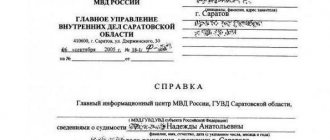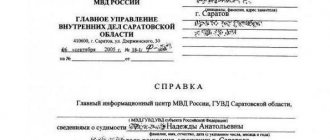Everyone understands in general terms what a “criminal record” is. In legal terms, a criminal record is a specific legal consequence of convicting a person on behalf of the state for a crime. But what does a “expunged” or “expunged” criminal record mean, and what legal consequences does it have for a citizen? AiF.ru spoke with lawyer Vladimir Kuleshov about this .
Question and answer Can a borrower with an expunged criminal record take out a loan?
What is an expunged criminal record, and what is an expunged one?
Vladimir Kuleshov draws attention to Article 86 of the Criminal Code of the Russian Federation, according to which a person convicted of committing a crime is considered to have a criminal record from the day the sentence enters into legal force until the criminal record is expunged or removed. Expungement of a criminal record is, in essence, the automatic termination of such status at the end of the period established by law. In addition, a criminal record can be expunged early, i.e. before the expiration of the repayment period provided for by the Criminal Code of the Russian Federation, if the convicted person, after serving his sentence, behaved impeccably, compensated for the damage caused by the crime, and applied to the court with a petition to have his criminal record removed. “It should be noted that a criminal record can also be cleared by an act of amnesty or pardon,” says the expert.
Vladimir Kuleshov emphasizes that a person with a criminal record, during its term, is limited in the choice of profession and place of work (study), for example, he cannot study in some educational institutions, work in sensitive organizations, serve in law enforcement agencies, etc. Persons those with a criminal record do not have the right to purchase, store or carry civilian weapons. They have restrictions in the field of voting rights, in choosing a place of residence, etc.
The criminal legal consequences of having a criminal record are that it is taken into account when determining recidivism of crimes and when assigning punishment. In turn, the presence of a relapse is a circumstance that aggravates the punishment (clause “a”, part 1, article 63 of the Criminal Code of the Russian Federation). Punishment for recidivism is imposed in a more strict manner (Article 68 of the Criminal Code of the Russian Federation). The presence of a criminal record also influences the assignment of a prison sentence to a type of correctional institution (Article 58 of the Criminal Code of the Russian Federation). In addition, it limits or completely excludes the possibility of applying to a person who has committed a crime again, exemption from criminal liability and punishment (Articles 75, 76 of the Criminal Code of the Russian Federation), the expert lists.
Question answer
Can a company refuse to hire a candidate because of an expunged criminal record?
What are the features of expunging and expunging a criminal record?
When a criminal record is expunged after the expiration of the period established by the Criminal Code of the Russian Federation, the legal consequences of the criminal punishment imposed by the court are automatically and unconditionally annulled. The period for expunging a criminal record depends on the category of severity of the crimes committed by the person, as well as on the age at which they were committed.
The second option is early expungement of a criminal record through the court, which is carried out at the request of a person who has served his sentence. The basis for the court's decision is the positive characterization of the convicted person, presented by the criminal-executive inspection of the Federal Penitentiary Service of Russia, and other documents indicating that the person behaved impeccably and also compensated for the harm caused by the crime.
Separately, provided for in Articles 84 and 85 of the Criminal Code of the Russian Federation, the possibility of early expungement of a criminal record by an act of amnesty issued by the State Duma of the Russian Federation or by the Decree of the President of the Russian Federation on the pardon of a specific person.
Conditional conviction
Conditional sentencing is a measure of a criminal law nature, which consists in establishing for a convicted person, whose correction can be achieved without actually serving the sentence, a probationary period during which the convicted person must prove his correction. At the same time, his behavior will be monitored by a special government body, and he may be assigned additional responsibilities to facilitate his correction.
If during the probationary period the convicted person evades control and fulfillment of the duties assigned to him, commits offenses or crimes, the suspended sentence may be revoked, after which the assigned punishment will begin to be actually executed. At the end of the probationary period or if, before the expiration of the probationary period, the conditionally convicted person has proven his correction by his behavior, the restrictions on the convicted person are lifted, and the criminal record is expunged.
Author of the article
What are the terms for expunging a criminal record?
According to Article 86 of the Criminal Code of the Russian Federation, a person who has been released from punishment by the court upon issuing a guilty verdict is considered to have no criminal record and, accordingly, is not subject to restrictions. In other cases, the period for expunging a criminal record is determined depending on the severity of the punishment imposed by the court.
Question answer
How punishments for crimes differ in different countries of the world. Infographics
Thus, a criminal record is considered expunged:
a) in relation to persons on probation - after the expiration of the probationary period appointed by the court;
b) in relation to persons sentenced to more lenient punishments than imprisonment - after one year after serving or executing the sentence;
c) in relation to persons sentenced to imprisonment for crimes of minor or medium gravity - after three years after serving the sentence;
d) in relation to persons sentenced to imprisonment for serious crimes - after eight years after serving the sentence;
e) in relation to persons convicted of especially serious crimes - after ten years after serving the sentence.
If the court released the convicted person early from his sentence, or the part of the sentence that the citizen did not serve was replaced with a more lenient one, the period for expunging the criminal record is calculated based on the actually served term of the sentence from the moment of release from serving the main and additional types of punishment.
According to Article 95 of the Criminal Code of the Russian Federation, for persons who committed crimes before reaching the age of 18, the terms for expunging a criminal record are reduced. They are equal:
a) six months after serving or executing a sentence less severe than imprisonment;
b) one year after serving imprisonment for a crime of minor or medium gravity;
c) three years after serving imprisonment for a serious or especially serious crime.
Question answer
Where do they require a certificate of no criminal record and how to get it?
Concept of criminal record
From the very term “criminal record” it follows that a person who has been convicted is considered to be convicted. But not everyone who stands before the court is considered convicted. Only in those cases when a person found guilty of committing a criminal offense is given a punishment in accordance with the law by a court verdict, can we say that he has been convicted.
If, during the trial, a person was released from punishment for any reason: either due to an amnesty or due to the expiration of the statute of limitations, although he was actually guilty of the criminal act committed, he is not considered to have been convicted, since the punishment for the crime committed did not occur. .
Thus, a criminal record is characterized, first of all, by the imposition of punishment for a criminal wrongful act by a court verdict.
A person who has been convicted by a court and sentenced to certain executive measures will be considered a convicted person until the conviction is expunged or removed by the court.
The time frame for expunging a criminal record depends on:
- on the type of criminal record - whether he was given a suspended sentence or received a real punishment;
- also from penalties. That is, whether they are related to the deprivation of liberty of the convicted person or not;
- from the category of criminal act itself, in cases where it is assigned, it is associated with deprivation of liberty.
Also, a convicted person can petition the court after he has served his sentence and believes that he has behaved in a sufficiently appropriate manner to have his criminal record expunged. The decision on the removal of a criminal record is within the competence of the criminal judge at the place of residence of the person applying to the court. If the court refuses to expunge the criminal record, a second petition can be filed after a year.
How to check your criminal record?
The possibility of obtaining information about the presence (absence) of a person of a criminal record (for example, when applying for a job in educational organizations or government agencies is provided for by the Administrative Regulations of the Ministry of Internal Affairs of Russia. As Kuleshov explains, information about a criminal record is stored in the Main Information and Analytical Center (GIAC) of the Ministry of Internal Affairs of Russia. Therefore You must submit an application there or to the information center of the territorial internal affairs body at your place of residence to receive the necessary information. If necessary, the application will be sent to prepare a certificate of territoriality. Now this certificate can be issued at the multifunctional center of public services.
The regulations also stipulate that applicants located outside of Russia receive the specified information through consular offices or consular departments of diplomatic missions of the Russian Federation, which receive information from the Main Information and Analytical Center of the Ministry of Internal Affairs of the Russian Federation.
Negative consequences of a criminal record
The negative aspects of a criminal record include:
- it is taken into account in cases of repeated commission of a crime when assigning punishment and selected punishment measures;
- also the impossibility of parole, even with the most excellent behavior and conscientious attitude to work in places of serving a sentence.
In addition, it is difficult to call the unspoken attitude towards persons who have a criminal record in the outside world friendly. Although the law does not state anywhere that persons who have been convicted cannot hold certain positions, very often employers are interested in information about their criminal record.
And, although the presence of a criminal record will not be a direct refusal to hire, a person will find a lot of reasons why he cannot be hired.
Persons with a criminal record, as a matter of course, cannot work in law enforcement, investigative and judicial bodies. In addition, they are unlikely to be able to get a job related to child care institutions or banking organizations.
And in general, few people want to have an employee who was convicted under criminal articles of the law and served a sentence in places of imprisonment or restriction of freedom. Therefore, before you cross the line of the law voluntarily and consciously, it is worth thinking about all the ensuing consequences in the future, and the immediate consequences of a criminal record.
Expungement of a criminal record in court
In a judicial procedure, a criminal record can only be expunged ahead of schedule. The procedure itself is like a lottery, because the case is reviewed again and if additional circumstances are discovered, then the criminal record may, on the contrary, be increased. But if there are compelling circumstances, then it is better to file a lawsuit to have your criminal record expunged early.
From practice it follows that if all documents are collected correctly and all conditions are met, then the application for early removal of a criminal record is resolved in a positive direction for the convicted person.
Other ways to expunge a criminal record
A criminal record can be expunged in two other ways:
- Due to the amnesty. Amnesty is a legal act of the legislative body aimed at the category of persons who have committed an offense, which states that persons serving sentences are exempt from criminal liability or the sentence is commuted. For persons who have already served their sentences, their criminal record is expunged.
- In connection with the pardon. A pardon differs from an amnesty in that it is issued only by the head of state and is aimed only at a specific person. To obtain a pardon, you need to write a petition, which the government authorities then forward for consideration.
The Criminal Executive Code of the Russian Federation specifies the procedure for pardon. Which includes:
- The resident writes a petition, which is registered with the administration.
- The administration sends the application within 20 days to the territorial body of the Ministry of Justice of the Russian Federation, which in turn submits it to the commission within 5 working days and informs the Federal Penitentiary Service.
- The FSIN contacts the Administration of the President of the Russian Federation once a month and provides information about the application.
- The Administration of the President of the Russian Federation provides information on applications once every 3 months.
- If the decision is positive, a Presidential Decree is prepared and announced. Then, within two days, he is sent to the Russian Ministry of Internal Affairs, to the territorial body of the state penal system.
Conditions
Removal of a conditional criminal record (that is, its early expungement) is possible under the following conditions:
- At least half of the probationary period has passed. Please note that the calculation takes into account the time of the trial, and not the duration of the assigned suspended sentence.
- The behavior of the convict is impeccable, which is confirmed by the inspector of the Criminal Investigation Department.
- The damage to the victim, if any, is fully compensated.
All conditions must be met, otherwise early removal of a criminal record is impossible. Everything must be supported by documents: certificates, characteristics, receipts, etc.
There are two more opportunities to be cleared of a criminal record early: amnesty and pardon. But the first does not depend in any way on the convicted person, and those sentenced to probation rarely resort to the second because of its specifics.
If the suspended sentence has already expired, then you do not need to take any action - the criminal record will be expunged automatically.
Application for expungement of criminal record - sample
There are several steps to go through before you receive a certificate of criminal record expungement. A court can remove a criminal record based on a submitted application. You can submit a petition to the nearest office at the citizen’s place of residence or to the court - in person, through Russian Post and online on the “My Arbitrator” portal.
The law does not have a strict application form for expunging a criminal record. It is enough to adhere to a number of recommendations on the content of the document, a sample of which can be obtained on our company’s website or ordered from the portal’s lawyers in person.
The sample application, according to judicial practice, contains the following points:
- details of the law enforcement agency at the place of application;
- information about the applicant;
- the main part of the document outlining the essence of the issue with references to the legislation of the Russian Federation;
- social and legal norms in relation to the convicted person - marriage, children, work, etc.
Additionally, the following documents must be attached to the application:
- sentence;
- certificate, certificate of terms of sentence served;
- a certificate of compensation for harm to the injured party, payment of compensation as a result of the crime;
- characteristics from relatives and management at the place of work;
- absence of claims against the applicant from law enforcement agencies - issued by the district police officer at the place of registration/residence.
Note!
Additionally, a medical report on the presence of diseases, as well as loyal references from the place of work and places of imprisonment, can help to remove a criminal record early.
Format of a petition to the court
Only a judge can vacate a criminal record if the request is granted in full. Depending on the category of the offense (administrative, criminal), the application is submitted to a court of general jurisdiction or a magistrate. In any case, it is necessary to be guided by the provisions established in Art. 31 of the Code of Criminal Procedure of the Russian Federation with rules on the jurisdiction of crimes.
All available evidence of good behavior should be attached to the application - a certificate of absence of police records, criminal records, place of work/study, information from neighbors, data on achievements, etc.
If the conviction is suspended, then the criminal record can be removed by submitting an application to the correctional inspection (CII), where the perpetrator is registered. Representatives of the Penitentiary Directorate independently go to court if at least ½ of the appointed period has passed.
Criminal record and its consequences
Criminal record as legal status
As noted earlier, a criminal record is the legal status of a person, which is a consequence of the person’s criminal liability. That is, a criminal record must appear, but it appears after a citizen has been found guilty of a criminal offense and the appropriate punishment has been applied to him.
According to the content of Article 86 of the Criminal Code of the Russian Federation (Criminal Code of the Russian Federation), a criminal record is assigned to a citizen of our country from the moment the court’s verdict regarding him entered into legal force, and until the moment this very criminal record is either expunged or the authorities in this regard are removed organizations.
The removal or expungement of a criminal record in the Russian Federation is relevant only for one reason - the presence of a number of legal and civil restrictions for convicted citizens. In particular, a convicted person cannot:
- hold a number of positions in government services (police, courts, etc.);
- carry out work in the field of pedagogy, which involves the education and training of minors;
- work in the legal profession, aviation and as a manager in the financial sphere;
- get a job in a number of other areas, the list of which is different for different types of crimes for which a criminal record was obtained (detective, security, etc.).
Also, depending on the type of offense committed, the convicted person is deprived of the opportunity to:
- be in military service;
- to be chosen;
- obtain a hunting license and a weapons license;
- adopt or take into care of minors;
- obtain Russian citizenship.
A more complete list of legal consequences for committing specific types of criminal offenses can be found in the relevant provisions of the Criminal Code of the Russian Federation.
In addition to the legal consequences, having a criminal record worsens a citizen’s position when his subsequent cases are considered in court. Thus, the legislation of the Russian Federation allows:
- resort to more serious punishment when rendering a verdict against persons who already have a criminal record (Articles 63-68 of the Criminal Code);
- choose a more strict type of correctional institution when rendering a verdict in relation to persons who already have a criminal record (Articles 58 and 83 of the Criminal Code);
- limit the application of amnesty to persons who already have a criminal record (Articles 75-76 of the Criminal Code).
Also, the authorities have the right to establish supervision over convicted citizens after their release from places of imprisonment, if there are suspicions of repeated commission of a crime on their part.
In general, the presence of a criminal record limits the constitutional rights of a citizen in a very wide range, therefore the relevance of the possibility of its removal and cancellation is quite high.
Early repayment terms
After the court’s decision to expunge the criminal record early and the act comes into force, the resident will be considered unconvicted and restored to his rights. Also, within 10 working days he will be removed from supervision at the criminal-executive inspection.
If the court did not expunge the criminal record early, then you can re-submit the petition to the court only after a year, unless there are other reasons that could influence the decision.
How to fill out a petition to expunge a criminal record
There is no standardized form for such a document, but there are rules for writing such statements. The petition consists of a head and a main part, which is divided into descriptive and operative.
In the header of the document at the top right, the resident indicates the data of the court and his own. Next in the middle is the name of the document.
Deadline for going to court
Of course, filing a petition with the court immediately after serving or executing a sentence will not work. Some time must pass so that subsequently the highest authority can be convinced that the person is no longer inclined to commit offenses.
There are no clear deadlines here, but by default the following framework is used:
- half of the probationary period established by the judicial authority for suspended prisoners;
- six months from the expiration of a sentence not related to actual imprisonment;
- 1.5 years, if the period of imprisonment is 5 years, but not more;
- 4 years for cases where the term is from 5 to 10 years;
- minimum 5 years if the person has served a sentence of more than 10 years.
However, despite the fact that in this case the timing plays a fairly large role, first of all, the fact of correction and repentance must be proven. A criminal record will be cleared ahead of schedule only when the court is convinced of this and there is no doubt left in it that the citizen has realized his mistakes and does not intend to return to his former life.
If the application is rejected, the person can apply again with a similar request. But you can make another attempt only after 12 months.








